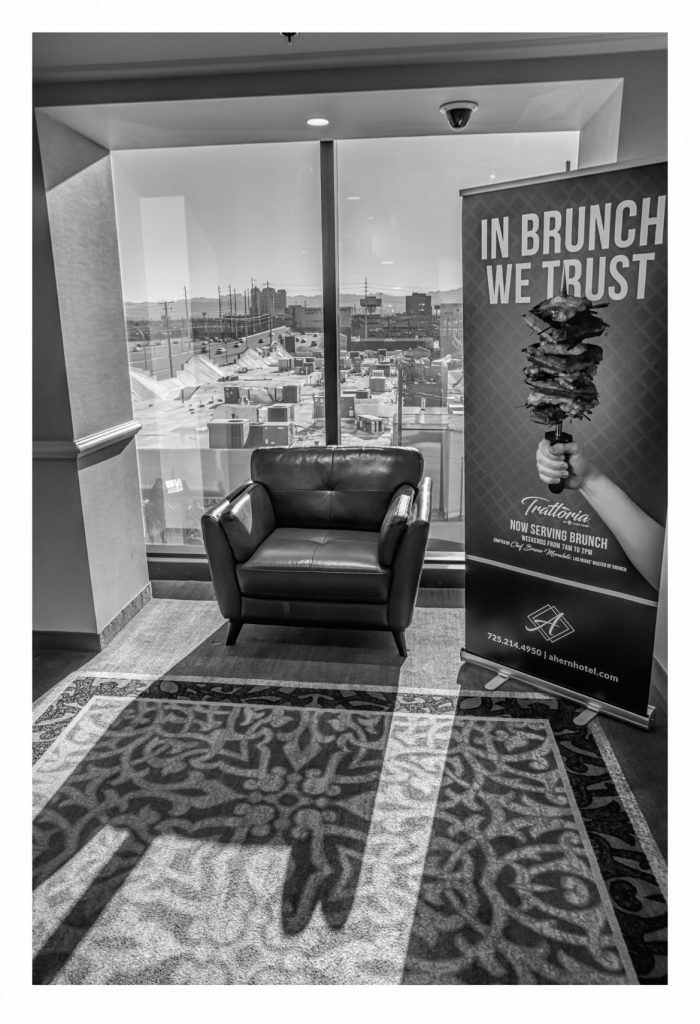Encountering Complex Symbolism
Discovering an exciting new English phrase in the wild.
An advertising professional produced this wordplay:
IN BRUNCH WE TRUST
I found this intransitive declaration on placards appearing on every residential floor of a Las Vegas hotel, opposite elevator doors. Each of seven landings had an urban backdrop showing through floor-to-ceiling picture windows: views of rooftops, cooling equipment, mountains and horizon below clear sky.
There is more to perceive here than land, building and cityscape. Notice sunshine pouring through glass, highlighting patterns on a rug; and byzantine forms interacting with a surprising shadow cast by the chair.
Notwithstanding these engaging designs, what actually draws your attention while waiting for the lift?
I think most people would say the ad-copy, the waffles, and other high-end breakfast materials — skewered and held up for examination — are the first things to catch the human eye, aiming the message at deep-rooted nerve cells, out of which strong appetites arise. The picture shows an anomaly, something unheard-of; it spins your head around. Who brandishes their breakfast like that on the shaft of a spear? It aims to make you feel gluttonous hunger (or imagine that you do); it summons you with blatant imagery and linguistic sleight-of-hand to partake of their $55.00 brunch.
It smells of triumph.
IN BRUNCH WE TRUST
If we disengage that engineered phrase from its background — pluck it out as if with tongs — and place it under magnification, how do we proceed with no field manual to guide us? How do we identify what we have found?
I thought at first I had captured an Eggcorn, defined as: “a word or phrase that results from a mishearing or misinterpretation of another, an element of the original being substituted for one that sounds very similar or identical.”
However, alike sounds are lacking: BRUNCH as substitute for GOD does not work at all; the words resonate at incompatible frequencies. There is also no re-interpretation of a misheard phrase in our advertisement, not when you consider the text has emerged from the agile mind of a merchandiser. He/She did not misunderstand anything about: “In God We Trust.” Depending on your worldview, the writer has either innocently borrowed our national motto, or has robbed, bowdlerized and defiled this sacred epigram to make payments on a Las Vegas mortgage.
I considered, then rejected a string of linguistic categories: malapropism, mondegreen, pun, double-entendre, metonymy, allusion, aphorism. Ultimately I decided the thing must be structured in layers — resistant to interpretation and subliminally inter-connected — a product of exceptional artifice concealing more than it reveals.
The advert scavenges the official motto of the United States and feeds upon it: “In God We Trust.” That phrase asserts that the political and economic prosperity of the nation rests in God’s hands; it appears on every cent, nickel, dime and quarter; and shows up on every piece of U.S. currency. When they substitute BRUNCH for GOD, are they really equating the two in a metaphorical sense: Brunch Is God? Or is it a softer similitude: Our Brunch Is Godlike?
IN BRUNCH WE TRUST
By associating their special breakfast with The Divine and with the trustworthiness of the U.S. governmental and economic system, the authors reveal a hyperbolic and perhaps disdainful cynicism.
The pitch-men continue in a parasitical fashion, yoking the hotel’s elegant meal to the Statue of Liberty in New York Harbor — the symbol of our democratic freedoms. The angle is slightly off — nevertheless that venerable motif has plainly been looted: the right arm raised at a classical angle, the right hand gripping a heavy weight. Except in this Vegas myth, the illumination comes not from a torch; instead, it emanates from a meat-skewer laden with greasy delights.
Yet another simile lurks beneath our advertising signage: “Our Las Vegas Is Like Italy.”
I visited the restaurant in question one weekday morning holding a voucher for my complimentary $6.95 breakfast. Its interiors seemed designed in a generic Mediterranean style, suggesting the place might be located in any country from Spain to Turkey. The hotel advertisement implies authentic Italian atmosphere and cuisine on weekends at a Trattoria — held in the same room where I enjoyed biscuits and gravy — serving elegant food, comparable to dishes you might enjoy in Italy, served with charm and composed of fresh ingredients locally-obtained. To punch-up this illusion, the cook’s name is mentioned near the bottom: CRAFTED BY Chef Bruno Morabito MASTER OF THE LAS VEGAS BRUNCH — more signs and signals pointing to Italy’s antique history. This hotel brunch is not prepared or cooked; it is crafted, its quality thus likened to the products of Old World Italian master craftsmen. The hoped-for conclusion: Bruno performs like a Renaissance artist. Or is it full-bore: Bruno is a European Renaissance maestro?
An ironic tone underlies all of it. What is being said (the surface) is not what is meant. Fraudulent appearances aim to manipulate unconscious thoughts. It is misappropriation — all of it, drawing lines between a weekend menu and God’s providential favor, and invoking high and sacrosanct concepts like human freedom and democratic values — all to promote a fashionable, over-priced meal.





